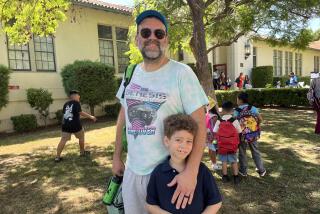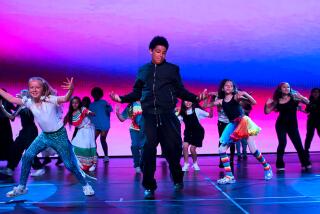Commentary: Savor those elementary school moments before they dance away
- Share via
This week, I attended my youngest son’s spring dance at his elementary school. After 12 spring dances (counting my oldest son’s tenure), this was my final one.
Recognizing the significance of this milestone, I stayed for the whole program. The transition from 5- to 11-year-olds reflected in the song selections.
I watched the younger kids dance to the Jackson 5’s “ABC” and the fifth-graders dance to Taylor Swift’s “Shake it Off.” As the kids got older, their music became newer and bolder.
The playground was packed with parents, some with the ubiquitous monopods, jockeying for position behind their child’s group of chairs to capture the memories.
I even remained for the finale, where all of the teachers performed a group dance. Usually by this time I’m already in my car headed toward work. But this was my last spring dance, my last elementary school event (not including the promotion ceremony), and I wanted to soak it all in.
Watching the joy on the children’s faces, I couldn’t help think about how different their academic lives will soon become.
With the end of elementary school vanishes all the support and protection and peace of mind that goes along with a small campus with comforting instructors and staff.
At middle school, the 20-minute recess gets cut in half, and the population nearly doubles.
How quickly the highly confident fifth-graders will transform into terrified sixth-graders as they attempt to navigate to six different classrooms, some located on opposite ends of campus, in breathless five-minute passing periods.
The one nurturing all-day teacher gives way to six one-hour teachers who hurriedly corral a fresh group into the classroom hour after hour after hour.
I have never understood why public schools long ago decided that the best thing for children right before they are about to enter puberty — the most dramatic change in their lives — is to be thrust into an environment that negates much of what they thrived in during the primary grades.
Middle school is the stage where many kids get lost educationally, some never getting back on track, struggling throughout high school.
The transition from elementary to middle school should be smoother, involving only three teachers: one in the humanities that teaches English and history, one in the math and science field, and one skilled in the arts.
Or, follow the lead of some preparatory schools by extending grammar school through the eighth grade.
Whenever I encounter a troubled student, I try to imagine him as a young child. He must have been cute once, respecting his elders, unafraid to dress in Spider-Man pajamas out in public, preferring Disneyland’s Dumbo ride to Six Flags’ Goliath roller coaster.
If only we could freeze the innocence of our children, shielding them from growing up too fast.
At the conclusion of the dance, as I returned to work and walked to my classroom, a few male students passed by me spewing out filthy language about sexual acts, unconcerned that I was a teacher. I wanted to stop and ask them, “What happened to you along the way?”
Atticus Finch tells his son Jem in “To Kill a Mockingbird” that “there’s a lot of ugly things in this world, son. I wish I could keep ‘em all away from you.”
I may not be able to hold back the ugliness in the world, or the shock of middle school, but I can celebrate this upcoming summer by delighting in my son’s present view of the world before it disappears.
He will never be as carefree as he was that day on the playground dancing with his fifth-grade classmates, overflowing with childhood. Per the title of the American Authors song also played that day, this was the “Best Day of My Life.”
BRIAN CROSBY is a teacher and the author of “Smart Kids, Bad Schools” and “The $100,000 Teacher.”
More to Read
A cure for the common opinion
Get thought-provoking perspectives with our weekly newsletter.
You may occasionally receive promotional content from the Los Angeles Times.










